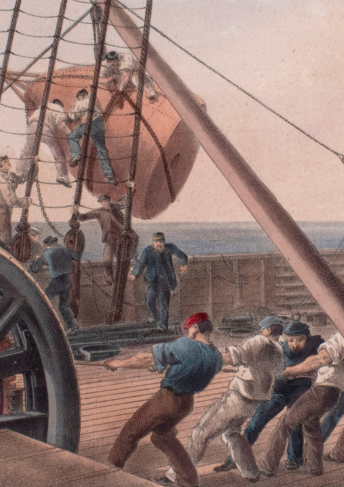Valerii Maximi Moralium Exemplorum Libri novem, summa diligentia castigati, ac fidelissimis eruditissimorum virorum Oliuerii. s. Arziganensis, Iodociq[ue] Badij Ascensii commentariis enarrati, quibus addita sunt quattuor & viginti exempla, nuper Aldi Manutii industria inuenta, eiusdem Ascensii commentariis exornata. Cum duplici indice, altero quidem capitum, altero vero eorum qu toto opere notatu digna visa sunt. Insunt prterea Theophili viri eruditissimi perutiles lucubrationes, qu tibi non mediocri erunt (si huius auctoris virtutes optime nosce volueris) adiumento.
Venetiis: apud Venturinum Ruffinellum, 1547 [colophon is 1546].
Price: $1,850.00
About the item
i-ii6 a-z8 AA-EE8 F6. [12], CCXXX leaves. Printers' woodcut device (Neptune slaying sea dragon) on title page. 1 vols. Folio (approx 12-1/2 x 8 -1/4 inches). 17th-century vellum, ms title on spine. Small restoration to the bottom of leaf 118, affecting perhaps the bottom of a letter, small tear to top right corner of title page, some underlining and marginalia by an early hand, two leaves in rear (ccxx & ccxxi) foxed. Overall the pages are very bright and crisp, a beautiful copy. Not in Adams; RLIN (2 copies: Cornell& Harvard).
Item #211700
Magnificent copy of this fine Venetian edition of the early Imperial historian Valerius Maximus , who flourished in the reign of Tiberius (and to whom he dedicates his book). The work itself is a curiously arranged compilation of historical anecdotes taken from various sources (Roman and Greek) to illustrate a particular theme, mostly moral or philosophical, and its historical value has never been highly regarded. Nonetheless, Valerius's prose has attracted the attention of many, and has been described as embodying a rhetoric in transition from Classical to Silver Latin. According to the 1911 Encyclopedia Britannica: "direct and simple statement is eschewed and novelty pursued at any price. The barrier between the diction of poetry and that of prose is broken down; the uses of words are strained; monstrous metaphors are invented; there are startling contrasts, dark innuendoes and highly coloured epithets; the most unnatural variations are played upon the artificial scale of grammatical and rhetorical figures of speech ... "
Valerius' book, nevertheless, was widely used as a schoolbook in the Middle Ages. Numerous incunable editions were printed; the first Aldine edition in 1502. This fine Venetian edition is by the printer Ruffinelli, who printed, among other important vernacular texts, the first edition of Euclid in Italian.

![Valerii Maximi Moralium Exemplorum Libri novem, summa diligentia castigati, ac fidelissimis eruditissimorum virorum Oliuerii. s. Arziganensis, Iodociq[ue] Badij Ascensii commentariis enarrati, quibus addita sunt quattuor & viginti exempla, nuper Aldi Manutii industria inuenta, eiusdem Ascensii commentariis exornata. Cum duplici indice, altero quidem capitum, altero vero eorum qu toto opere notatu digna visa sunt. Insunt prterea Theophili viri eruditissimi perutiles lucubrationes, qu tibi non mediocri erunt (si huius auctoris virtutes optime nosce volueris) adiumento](https://jamescumminsbookseller.cdn.bibliopolis.com/pictures/211700.jpg?width=768&height=1000&fit=bounds&auto=webp&v=1412654951)
![Valerii Maximi Moralium Exemplorum Libri novem, summa diligentia castigati, ac fidelissimis eruditissimorum virorum Oliuerii. s. Arziganensis, Iodociq[ue] Badij Ascensii commentariis enarrati, quibus addita sunt quattuor & viginti exempla, nuper Aldi Manutii industria inuenta, eiusdem Ascensii commentariis exornata. Cum duplici indice, altero quidem capitum, altero vero eorum qu toto opere notatu digna visa sunt. Insunt prterea Theophili viri eruditissimi perutiles lucubrationes, qu tibi non mediocri erunt (si huius auctoris virtutes optime nosce volueris) adiumento](https://jamescumminsbookseller.cdn.bibliopolis.com/pictures/211700_1.jpg?width=768&height=1000&fit=bounds&auto=webp&v=1482075025)
![Valerii Maximi Moralium Exemplorum Libri novem, summa diligentia castigati, ac fidelissimis eruditissimorum virorum Oliuerii. s. Arziganensis, Iodociq[ue] Badij Ascensii commentariis enarrati, quibus addita sunt quattuor & viginti exempla, nuper Aldi Manutii industria inuenta, eiusdem Ascensii commentariis exornata. Cum duplici indice, altero quidem capitum, altero vero eorum qu toto opere notatu digna visa sunt. Insunt prterea Theophili viri eruditissimi perutiles lucubrationes, qu tibi non mediocri erunt (si huius auctoris virtutes optime nosce volueris) adiumento](https://jamescumminsbookseller.cdn.bibliopolis.com/pictures/211700_2.jpg?width=768&height=1000&fit=bounds&auto=webp&v=1412654953)
![Valerii Maximi Moralium Exemplorum Libri novem, summa diligentia castigati, ac fidelissimis eruditissimorum virorum Oliuerii. s. Arziganensis, Iodociq[ue] Badij Ascensii commentariis enarrati, quibus addita sunt quattuor & viginti exempla, nuper Aldi Manutii industria inuenta, eiusdem Ascensii commentariis exornata. Cum duplici indice, altero quidem capitum, altero vero eorum qu toto opere notatu digna visa sunt. Insunt prterea Theophili viri eruditissimi perutiles lucubrationes, qu tibi non mediocri erunt (si huius auctoris virtutes optime nosce volueris) adiumento](https://jamescumminsbookseller.cdn.bibliopolis.com/pictures/211700_2_1.jpg?width=768&height=1000&fit=bounds&auto=webp&v=1482075025)
